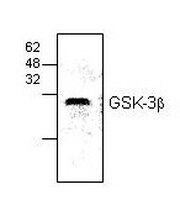PK1111 Sigma-AldrichAnti-GSK-3β Rabbit pAb
Anti-GSK-3β, rabbit polyclonal, recognizes the ~46 kDa GSK-3β protein in mouse small intestine tissue. It is validated for use in Western blotting and immunohistochemistry.
More>> Anti-GSK-3β, rabbit polyclonal, recognizes the ~46 kDa GSK-3β protein in mouse small intestine tissue. It is validated for use in Western blotting and immunohistochemistry. Less<<Recommended Products
Overview
| Replacement Information |
|---|
Key Spec Table
| Species Reactivity | Host | Antibody Type |
|---|---|---|
| H, M, R | Rb | Polyclonal Antibody |
| References | |
|---|---|
| References | Garrido, J.J., et al. 2007.FEBS Lett. 8, 1579. Meares, G.P. and Jope, R.S. 2007.J Biochem. 23, 16989. |
| Product Information | |
|---|---|
| Form | Liquid |
| Formulation | In PBS, 30% glycerol, 0.5% BSA. |
| Positive control | Mouse small intestine |
| Preservative | 0.01% thimerosal |
| Quality Level | MQ100 |
| Physicochemical Information |
|---|
| Dimensions |
|---|
| Materials Information |
|---|
| Toxicological Information |
|---|
| Safety Information according to GHS |
|---|
| Safety Information |
|---|
| Product Usage Statements |
|---|
| Packaging Information |
|---|
| Transport Information |
|---|
| Supplemental Information |
|---|
| Specifications |
|---|
| Global Trade Item Number | |
|---|---|
| Catalogue Number | GTIN |
| PK1111 | 0 |
Documentation
Anti-GSK-3β Rabbit pAb SDS
| Title |
|---|
Anti-GSK-3β Rabbit pAb Certificates of Analysis
| Title | Lot Number |
|---|---|
| PK1111 |
References
| Reference overview |
|---|
| Garrido, J.J., et al. 2007.FEBS Lett. 8, 1579. Meares, G.P. and Jope, R.S. 2007.J Biochem. 23, 16989. |













 Antibody[214983-ALL].jpg)

